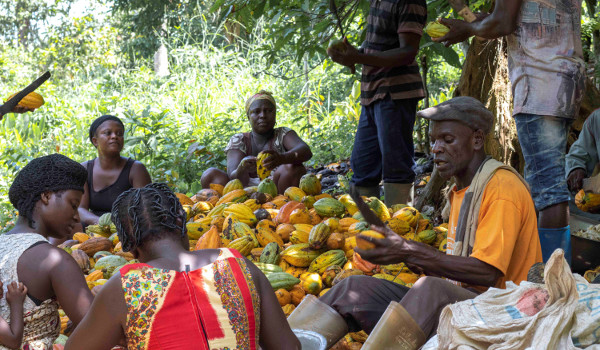BY LEO NELSON
Ghana’s embattled cocoa farmers, the backbone of the nation’s economy, are once again at loggerheads with the government, demanding their rightful 70% share of the Free-On-Board (FOB) price of cocoa.
This thunderous renewed call comes hot on the heels of President John Dramani Mahama’s recent pledge to announce a “significantly improved” cocoa producer price in August 2025.
But farmers, scarred by years of unmet promises and paltry earnings, are far from appeased. Their skepticism is palpable, a bitter residue of countless pledges that have dissolved into policies offering little genuine benefit.
Stephenson Anane Boateng, the outspoken President of the Ghana National Cocoa Farmers Association, minced no words in his response to the President’s goodwill tour. “Cocoa farmers, we are also Ghanaians,” he declared, his voice a conduit for the collective frustration of thousands.
“The Constitution states it clearly that the FOB price should be considered 70 percent for farmers, so why do successive governments come out with their own projections or proposals?”
Anane Boateng’s scathing critique lays bare a long-standing grievance: the perception that the indispensable role of cocoa farmers in Ghana’s economic tapestry is consistently undervalued, their toil generating immense wealth that largely bypasses their pockets.
The disparity between farmers’ earnings and the true global value of Ghana’s cocoa exports has created a crisis in rural livelihoods. Inadequate pricing condemns many cocoa-growing families to poverty, driving child labor and forcing a heartbreaking exodus of youth from farming communities.
A guaranteed 70% of the FOB price, farmers argue, is not merely a demand for fairness; it is an economic lifeline. Such a commitment would unlock reinvestment in sustainable farming practices, encourage the adoption of modern technology, and fortify Ghana’s cocoa sector against future shocks, ensuring its international competitiveness.
Adding to the simmering tensions, farmers are raising alarm bells over proposed government-led commercial cocoa farming initiatives. Anane Boateng issued a stark warning: industrial-scale cocoa farming, while seemingly attractive, could decimate the livelihoods of countless smallholder farmers if implemented without meticulous foresight.
“I don’t see the essence of government proposing for commercial cocoa farms,” Anane Boateng scoffed, drawing a pointed parallel to Ghana’s past economic missteps. “This is because our first President Dr. Kwame Nkrumah established a lot of factories and State Farms—where are they now?”
He stressed that such ventures demand a clear, long-term vision that seamlessly integrates existing farmers and champions equitable growth. Without it, the specter of commercial entities monopolizing land and resources looms large, threatening to sideline the very custodians of Ghana’s revered cocoa legacy.
The previous NPP administration, in November 2024, nudged the cocoa producer price from GH₵48,000 to a meager GH₵49,600 per tonne – a paltry increase from GH₵3,000 to GH₵3,100 per 64kg bag.
While any increase is ostensibly welcome, farmers contend these adjustments are woefully insufficient for them to genuinely thrive. Incremental rises, detached from the global FOB price and the constitutional benchmark, fail to address the systemic inequities plaguing cocoa pricing.
As global cocoa prices soar and Ghana remains a titan in the market, the New Republic calls on the government to act decisively.
The farmers who meticulously cultivate this golden crop cannot, and must not, be left behind.
For Ghana to retain its coveted position as a global cocoa giant, it must champion the interests of its farmers, forge equitable policy frameworks, and commit to long-term investments that truly empower those who are the very heart of this vital industry.

